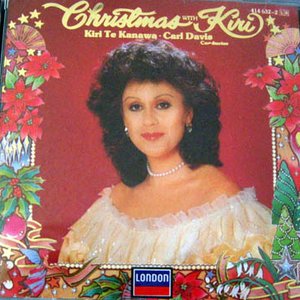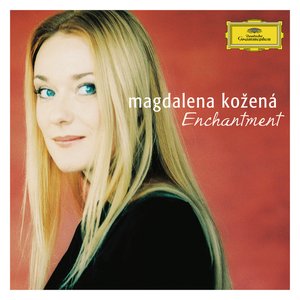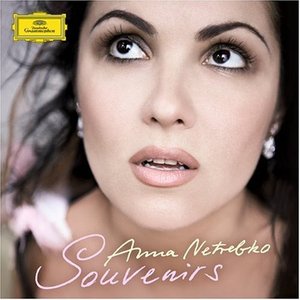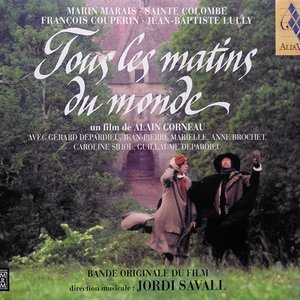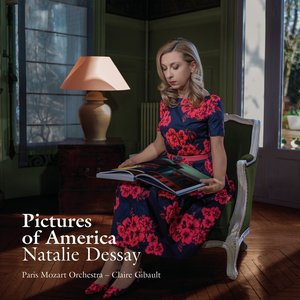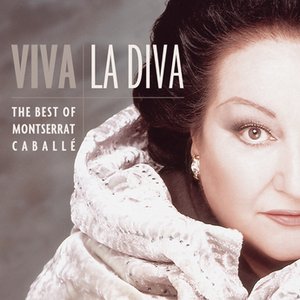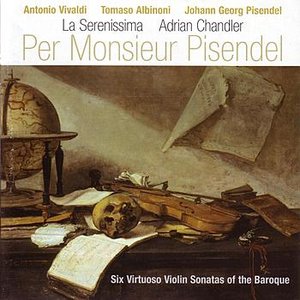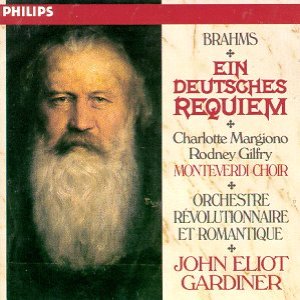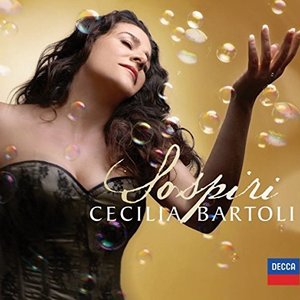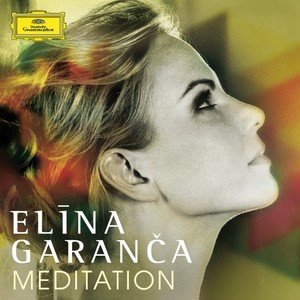Wiki
-
Release Date
1 January 2007
-
Length
17 tracks
Although her performances of baroque and classical period music are acclaimed by many, Cecilia Bartoli's strength has always been in the bel canto music of her homeland. Both her Covent Garden performances as Fiorilla in Rossini's Il turco in Italia and the recording of the opera on Decca remain my favourite examples of the singer's work: she understands the style of this music. The high degree of expression with which she approaches everything she sings is more suited to the overt emotions of Rossini and his contemporaries than Mozart and Handel, to my mind. So I find it a joy to see her returning to mostly Italian opera of the early nineteenth century for her new album, Maria, which is complemented by a concert tour including two dates at the Barbican in December 2007.
The album is well thought out, presented and executed. Bartoli sounds wonderfully fresh and exciting throughout and the accompaniment of Adam Fischer and the Orchestra La Scintilla is exemplary. But what excites is the selection of material, well matched by an imaginatively designed and presented CD case. Earlier in the year, Opera Rara produced a CD of songs and arias connected to or written by the singer Pauline Viardot; Bartoli's new disc explores the career of Viardot's older sister, Maria Malibran, who was one of the greatest singers of the nineteenth century. The most famous member of the García family, Malibran joined her father Manuel (a tenor and composer), her mother Joaquina Sitches (a soprano), her older brother Manuel (a baritone who wrote a seminal treatise on singing) and her sister Pauline on a trip to America, where the family starred in the continent's first production of Don Giovanni (helped by Da Ponte, no less, who was living in New York). Amongst a family of outstanding musicians, she shone. But at the age of seventeen she married Eugène Malibran, a Frenchman of Spanish descent who was twenty-eight years older. The marriage was unhappy, and she returned to Europe, alone, forging a brilliant career for herself in Paris with the help of Rossini (who she had known from an early age because her father had been in the Rome premiere of Il barbiere di Siviglia).
While there, she met the Belgian violinist Charles de Bériot and started an affair with him, scandalising Parisian society so much that she felt forced to leave. Audiences in England and particularly Italy, however, adored her, and she became an iconic figure in the Risorgimento. Her marriage to Malibran was finally annulled in 1836 and she married De Bériot. But the happiness of her second marriage was cut short in the autumn of that year. She died in Manchester, pregnant, from injuries sustained during a riding accident.
While the vocal ranges of Cecilia Bartoli and Maria Malibran are probably not exactly matched - one can't really imagine Bartoli singing the whole of a heavy opera like Norma, for instance - all the selections on this disc are eminently suited to Bartoli's voice. There's no hint of strain, and she sounds equally relaxed with the demands of tessitura (from a low E below middle C up to a high C) and those of fioritura (decoration). It really is worth investing in the deluxe edition of the CD: I don't think I've ever seen such a well-presented disc from Decca. They give us a concise biographical note about Malibran, essays that explain her vocal type and the background to the arias, full texts and translations and illustrations of Bartoli's collection of Malibran memorabilia, which she's taking with her on her tour by way of an exhibition to accompany the concerts. Even before you play the CD, exploring the hard-bound case with integrated booklet is a pleasurable experience.
But the main event, of course, is the singing, which confirms Bartoli's stature as one of the great singers of today. She seems so well suited to these arias by nine composers that one wonders why she doesn't focus more on this repertoire. The arias by Bellini are particularly lovely and whet the appetite for a complete recording she's made of La sonnambula with Juan Diego Flórez. No doubt Flórez will make a more compelling Elvino than Celso Albelo, the tenor used on Bartoli's disc for her performance of Amina's final aria from the opera, 'Ah! non giunge', but even Albelo's inadequate singing cannot diminish the mezzo's magnificent performance here. The touching restraint of Elvira's mad scene from I puritani finds the singer at her best, while the surprise of the disc is perhaps 'Casta Diva' from Norma. Bartoli instils this most hackneyed of arias with a silvery reverence that suits the lyrics and for me casts aside the dominance of Callas' iconic recordings of the piece.
The other items on the disc are mainly obscure but most of them prove to be revelatory. The final scene from Pacini's Irene is an extraordinary climactic prayer, and Bartoli makes it suitably urgent and heartfelt - as with the Bellini, the clean lines of the melody suit her down to the ground. Pacini is also represented by an insertion aria for Rossini's Tancredi. 'Dopo tante e tante pene' was an alternative rondò written for Malibran's performance of the opera on 21 November 1834 in Naples when her first appearance there two nights earlier had been unsuccessful. Inevitably, Bartoli revels in the astonishing coloratura writing of the piece and she nails the high C at the end quite breathtakingly. Ines' romanza from Giuseppe Persiani's Ines de Castro is conventional but beautiful, benefiting from a flute, cello and harp accompaniment that resemble Donizetti in Lucia di Lammermoor, and Bartoli's gentle approach serves the piece well.
Some of the most interesting items on the CD derive from the pens of Malibran and her father. The lively castanet and flamenco clapping of the excerpt from Manuel García's El poeta calculista were an unexpected delight to me; no less appealing is the more serious aria with chorus for Semiramide from García's opera written for America, La figlia dell'aria, again an ideal vehicle for Bartoli's vivid and confident attack. Malibran herself is represented in two items: a spirited 'Rataplan' and an insertion aria for Donizetti's L'elisir d'amore. These pieces seem to indicate a serious talent for composition, though Bartoli's sparkling singing certainly helps.
However, the two most fascinating tracks are by composers I didn't expect to appear alongside Bellini and Pacini. Hummel's 'Air à la tirolienne avec variations' is an entertaining little number written for and first performed by Malibran that calls on her to yodel and then sing variations on it in Hungarian and Rossinian style. Bartoli relishes the challenge and injects the piece with incredible character, not least thanks to some exquisite half-tones. But my favourite is the concert aria by Mendelssohn, 'Infelice'. It contains a prominent violin solo and was intended for performance by both Malibran and her lover, De Bériot, though in the end they never had the opportunity to perform it. Bartoli's solo violinist on the disc is Maxim Vengerov, making a very beautiful cameo appearance. The two work together sympathetically in the lovely Adagio section, but what impresses is the singer's ability across the whole twelve-minute piece. The recitative is dramatic; the Adagio is crafted with a subtle, caressing timbre; the Allegro is vital. For me, it is the crowning glory of one of the most exciting new recordings of the year.
- By Dominic McHugh -
Lineup]/b]
Celso Albelo (ten) (Elvino, Riccardo)
Luca Pisaroni, bass-bar (Giorgio)
Maria Goldschmidt (flute)
Robert Pickup (clarinet)
Una Prelle (harp)
Maxim Vengerov (violin)
Ada Pesch (violin)
Daniel Pezzotti (cello)
Claudio Mermoud (guitar)
International Chamber Soloists / Jurg Hammerli
Orchestra La Scintilla / Conductor: Adam Fischer
Recorded: Kirchgemeinde, Zurich-Oberstrasse, August-October 2006
Notes in English, French and German
DECCA 475 9078
Album descriptions on Last.fm are editable by everyone. Feel free to contribute!
All user-contributed text on this page is available under the Creative Commons Attribution-ShareAlike License; additional terms may apply.
